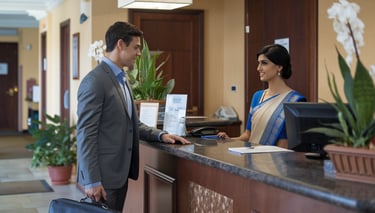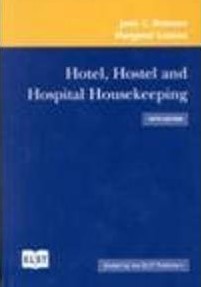Guest Departure Procedure
In hospitality operations, the departure process is the last phase of the guest cycle. It includes everything from informing the hotel personnel of the guest's departure to making sure the checkout process runs well. In order to make a lasting impression on the guest—which may affect future reservations and reviews—a seamless and effective departure procedure is essential. This chapter examines the many facets of guest departure, such as staff duties, notifications, expedited checkout processes, and late checkout regulations.
4.1 Departure Notification
The guest's departure procedure begins with the departure notification. It guarantees that the hotel staff is aware of the guest's intention to check out ahead of time, allowing them to make arrangements for a smooth stay. By making sure that all of the guests' demands are immediately satisfied, effective communication at this point not only improves operational efficiency but also helps to ensure guest pleasure.
Methods of Notification:
a) Verbal Notification: Visitors can communicate their departure arrangements to the concierge or front desk employees directly. This conventional approach, which depends on in-person or phone communication, works well for visitors who have last-minute adjustments or who want one-on-one connection.
b) Digital Notification: A lot of hotels nowadays offer digital platforms for informing guests of their departure. These might be emails, online booking services, or mobile apps. Tech-savvy visitors will find digital means handy, and the hotel can keep a record of the notice.
c) Scheduled Departure: During check-in or at another time during their visit, some visitors give their departure information. This proactive strategy aids in prior planning for the hotel and is especially helpful during periods of high operational demand, such as peak seasons.
Importance of Departure Notification:
a) Efficient Housekeeping Operations: Knowing the exact time of a guest's departure helps the housekeeping team plan room cleaning and preparation for incoming guests. This reduces downtime and ensures a smooth room turnover process.
b) Accurate Billing and Settlements: The departure notification prompts the billing team to consolidate all guest charges, including room fees, dining, and additional services, ensuring the final bill is precise and ready for review at checkout.
c) Organized Luggage Assistance: Departure notifications allow the bell desk to schedule luggage handling efficiently, ensuring prompt service for guests, especially those with strict schedules or transportation needs.
d) Enhanced Guest Satisfaction: A well-organized departure process reflects professionalism and attentiveness, leaving a lasting positive impression. This improves guest loyalty and encourages repeat bookings.
4.2 Tasks Performed at Bell Desk, Cashier/Reception
To guarantee a seamless and effective checkout procedure, a number of duties are coordinated across departments, thereby improving the visitor experience. The main duties performed by the cashier/reception and bell desk personnel are described in detail below:
Bell Desk Responsibilities:
Responsibilities for Departure Assistance:
a) Luggage Retrieval and Transfer: Ensuring guests’ luggage is promptly collected from their rooms and safely delivered to the departure point.
b) Luggage Tags and Records: Managing luggage tags and maintaining accurate records, particularly for group checkouts.
c) Transportation Arrangements: Organizing transportation based on guests’ preferences and requirements.
d) Coordination with Local Transport Providers: Liaising with local services for airport transfers, taxis, or private car bookings.
e) Special Transport Requirements: Assisting with specific needs, such as arranging wheelchair-accessible vehicles or tour buses.
f) Feedback Collection and Last-Minute Issue Resolution: Gathering guest feedback and addressing any final concerns to ensure a positive experience.
g) Guest Engagement: Engaging with guests to understand their stay experience and resolve any unresolved issues.
h) Feedback Communication: Sharing guest feedback with relevant departments to support ongoing service improvements.
Cashier/Reception Responsibilities:
a) Bill Finalization: Compiling all charges incurred during the stay, such as room fees, dining, spa services, minibar usage, and other additional expenses.
b) Discrepancy and Payment Review: Verifying for any discrepancies or outstanding amounts, including advance deposits or incomplete payments.
c) Payment Processing: Facilitating secure transactions through multiple payment methods, such as cash, credit/debit cards, mobile wallets, or other digital platforms.
d) Refunds and Adjustments: Handling refunds for security deposits or making adjustments for any overpaid amounts, if applicable.
e) Receipt Issuance: Providing guests with a detailed and itemized invoice to ensure transparency in all charges.
f) Billing Assistance: Addressing guest queries regarding their bills, such as clarifying charges or correcting any errors.
g) Feedback Collection: Encouraging guests to share their experiences through feedback forms or online platforms like Google Reviews and TripAdvisor.
h) Feedback Importance: Emphasizing the value of their feedback in enhancing and improving service quality.
4.3 Express Checkouts
Express checkout is a simplified process designed for guests who wish to save time by bypassing traditional checkout procedures. It is particularly beneficial for business travelers due to its convenience and efficiency.
Process:
Guests are offered the option for express checkout during check-in or at any time during their stay.
A pre-authorization hold on the guest’s credit/debit card ensures automatic settlement of any pending charges.
Guests can drop off their keys at a designated location or use self-checkout kiosks.
Advantages:
Saves time for both guests and hotel staff.
Reduces crowding at the reception desk.
Provides a seamless, contactless experience.
Challenges:
Ensuring accurate posting of all charges to the guest’s account.
Addressing any billing disputes or queries after the guest's departure.
Late Checkouts and Charges
Late checkouts occur when guests request to extend their stay beyond the standard checkout time. While accommodating these requests can enhance guest satisfaction, it requires careful management and planning.
Policies for Late Checkouts:
Complimentary Extensions: Offered for a limited duration (e.g., 1–2 hours) based on availability.
Hourly Charges: Guests are billed a fixed rate for each additional hour.
Full-Day Charges: Applied if the stay significantly extends into the next day.
Factors Influencing Late Checkout Approvals:
Availability of rooms for incoming guests.
Guest’s loyalty status or special occasions.
Operational demands on the housekeeping team.
Communication:
Clearly inform guests about late checkout policies at the time of booking or during their stay.
Provide written confirmation for any approved extensions.
Key Terms
Departure Notification: A communication from the guest about their intent to check out.
Express Checkout: A faster, more convenient checkout process that minimizes formalities.
Pre-Authorization Hold: A temporary hold on a guest’s credit/debit card for incidental expenses.
Late Checkout Fee: A charge applied for extending the stay beyond standard checkout times.
Bell Desk: A service area responsible for luggage handling and guest assistance during arrivals and departures.


FRONT OFFICE









